
Blog: Reflection on Advocacy with WHO for Non Communicable Disease in Emergencies
![]() Dr Mhoira Leng
Dr Mhoira Leng
![]() 11th April 2024
11th April 2024
Non communicable diseases (NCDs) and emergencies are an area that can take a back seat when humanitarian emergencies occur. During such emergencies, the focus is on rescue and management of injuries. Yet we also know that the toll from illness such as heart attacks, strokes, lung problems, cancer, diabetes, and kidney disease will dramatically rise in an emergency where stress is everywhere and access to health care and essential medicines becomes impossible. Attending the World Health Organisation (WHO) Executive Board meeting as a representative of the IAHPC gave me an opportunity to explore these issues. As part of the 154th Executive Board of WHO, I read a Constituency Statement on behalf of IAHPC as well as gave an Individual Statement under the Global Health and Peace Initiative.
Across all this is the need for pain control, such as for those with advancing cancer, for those with burns and crush injuries, for women delivering babies, for those at the end of their lives and who need to die with dignity. Underpinning this is holistic care for patients, families, and staff: this is core palliative care.
Just stop for a minute and imagine being unwell in Gaza right now. There are almost NO strong painkillers like oral morphine available for ANYONE. So many factors lead to the lack of strong painkillers, but it is truly terrible and adds immeasurably to the suffering.
It was a privilege to attend the first WHO High Level Meeting on Non-Communicable Diseases in Humanitarian Emergencies in Copenhagen. So much work has gone into this, not least from the Eastern Mediterranean Office (EMRO) of WHO. It was heartening to see the member states attend (including Uganda) and many side events highlighting specific issues.
A recent report was shared which projected the risk of death and disease from NCDs in Gaza, but also infectious disease as the informal living arrangements are truly terrible. For example, right now in Gaza there is one toilet for 600 people and no clean water.
I took part in the Palliative Care side event and we had speakers either online or in the room from MSF, Vietnam, Haiti, Australia, Bangladesh, Sudan and Scotland (yours truly).
We are beginning to link more about NCD support with colleagues in Gaza, the Ministry of Health and in WHO. However, without a ceasefire the risk remains high for everyone and the ability to offer support is so limited. Oral morphine access is very complicated, but we hear so many stories of terrible pain and suffering which is heartbreaking and demoralising for staff, that we are keeping looking for ways to bridge this gap.
(Dr Mhoira Leng has since travelled with a Canadian team to explore these issues further and offer some clinical support, but most of all solidarity and presence. Another blog will be posted with further updates.)
The last few weeks have been special for Muslims with Ramadan and for Christians with Easter. As we consider the time with its usual celebration, listen to what Suha, our wonderful oncology and palliative care pharmacist says.
“Like these days in previous years, we were racing to receive Ramadan with decorations, lanterns, and preparing Suhoor and Iftar menus throughout the month.
The streets of Khanyounis were full of people, decorations, crowds, and sounds of Ramadan welcoming songs.
Ramadan comes this year and we can't receive it in what befits it.”
The niece of Dr Amjad adds this,
“We just wanted the most beautiful month of the year to come while we were in our homes preparing for it at this time. Five months … and our hopes, hearts, dreams, wishes, and finally our future are still destroyed. Thank you, world.”
Please continue to keep informed, be involved in any way you can, and pray. Here is a beautiful prayer from Professor Alison Phipps and a reply from her Gaza colleagues:
Bless the helplessness
Bless the utter helplessness
Bless the unutterable agony of utter helplessness
Bless the endlessness of the helplessness
Of a helplessness that still resists death daily
Even as the helpless are dying for want of help
With the reply from Akram Sobhi Habeeb:
Bless the help that never ends,
Bless the endlessness of our friends
Bless those who defy despair by planting hope,
Bless the despair that ends with a strong rope,
Bless those who pray for the end of the war,
Bless those who keeps trying to open for us the door,
Bless those who keep praying for our cute kids,
Bless those who keep trying to make us well fed!
If you wish to donate to Cairdeas, then we are able to direct this to areas most in need.
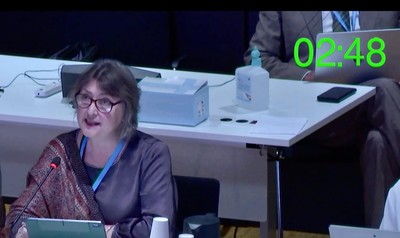
Snapshot of Dr Mhoira Leng speaking on behalf of IAHPC at the WHO 154th Executive Board.
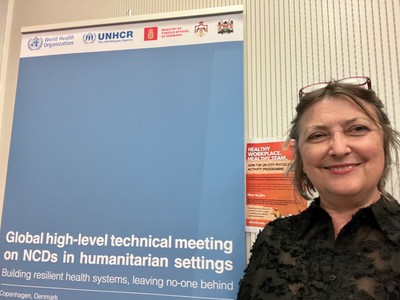
Sharing voices and the need to consider NCDs in humanitarian settings and emergencies.
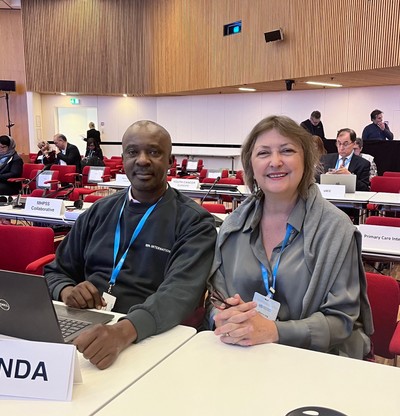
After spending February in India, Dr Mhoira Leng sits with colleagues from Uganda at the first WHO High Level Meeting on Non-Communicable Diseases in Humanitarian Emergencies in Copenhagen.
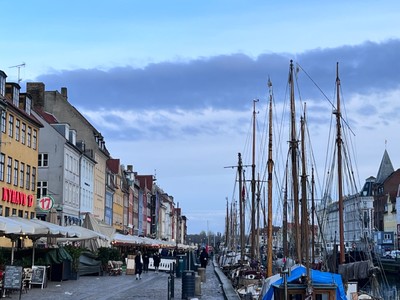
Skies bright with hope in Copenhagen.
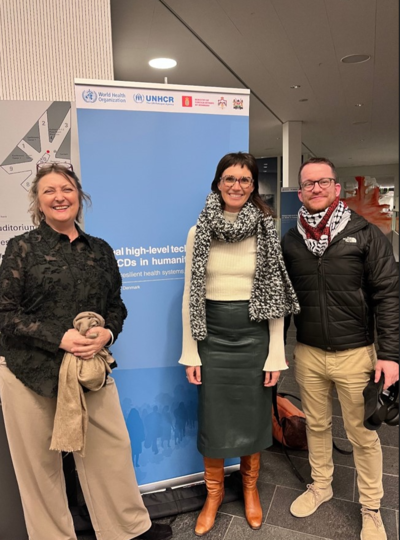
A pleasure to see fellow colleagues in the humanitarian settings; Dr Rachel Coghlan and Dr James Smith.
